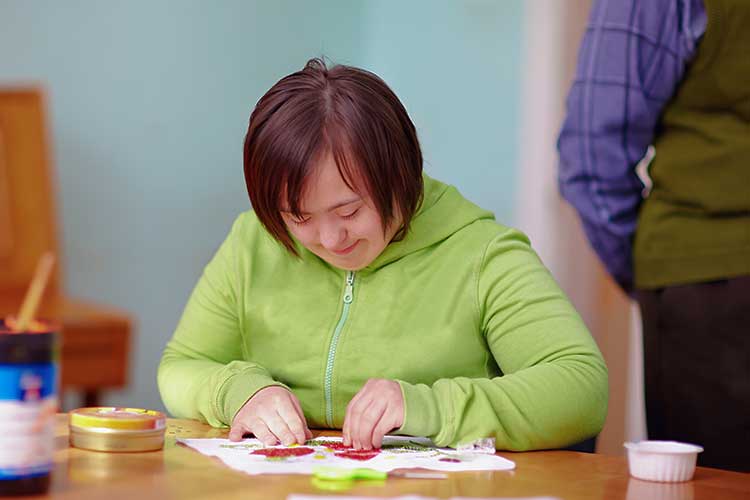All providers of National Disability Insurance Scheme (NDIS) services are required to deliver supports that are person-centred - but what exactly does this entail?
What is Person-centred Care?
Person-centred care is a holistic approach to healthcare grounded in a philosophy of personhood. It promotes self-determination, empowerment and a commitment to providing healthcare that is responsive to the individual's needs and preferences.
Person-centred health professionals are ethical, open-minded, empathetic, respectful and self-aware, with a profound sense of moral agency (Levett-Jones et al. 2014).
What Does it Mean to Deliver Supports in a Person-Centred Way?
- The person is at the centre of the care they are receiving and is supported to make decisions about their life.
- The person’s life experiences, age, gender, culture, heritage, language, beliefs and identity are all taken into account in the delivery of care.
- The services provided are flexible to meet the person’s preferences and priorities.
- Care is strengths-based; in other words, there is a greater focus placed on what the person can do rather than what they require help with, and the person is considered to be the expert of their own life. The person’s support networks work with the service provider in a partnership.
(NSW Health 2022)
Overall, the goal of person-centred care is to enable the person to establish and maintain control over their life (NSW Health 2022).
Person-centred Supports in the NDIS Practice Standards
Person-centred supports are a requirement of the NDIS Practice Standards under Core Module 1: Rights and Responsibilities.
This Practice Standard aims to ensure that NDIS participants are able to:
- Access supports that respect and uphold their legal and human rights
- Make informed decisions and exercise control
- Access supports that promote, uphold and respect freedom of expression, self-determination and decision-making.
(NDIS 2021)
NDIS providers must meet the following quality indicators:
- Providers acknowledge and incorporate the legal and human rights of participants into everyday practice
- Providers communicate with participants in a way that:
- Is responsive to their needs
- They are able to understand (through the use of appropriate language, mode of communication and terminology)
- Participants are supported to engage with their family, friends and community (as decided by the participant).
(NDIS 2021)
The Benefits of Person-centred Care
Person-centred care has numerous benefits, including:
- Increased care satisfaction
- Decreased risk of depression and anxiety
- Improved functional status
- Increased social engagement
- Increased quality of life.
(Respect 2024; ARIIA 2023)
Viewing NDIS Participants as Individuals

An important part of delivering person-centred care is understanding the person as an individual ‘with a past, present and future’ and acknowledging their strengths and qualities (ARIIA 2023).
It’s important to know:
- The person’s history beyond their support plan
- What matters to the person e.g. their relationships, routines and interests
- The person’s goals for the future
- The way in which the person would like to be supported
- The way in which the person communicates
- The way in which the person makes decisions
- What the person feels is and isn’t working in regards to the support they are receiving
- The person’s friendships, relationships and community.
(NDS & HSA 2014)
Practical Ways to Implement Person-Centred Care
Examples of person-centred care in everyday practice include:
- Smiling and introducing yourself
- Wearing a name tag
- Explaining your role
- Asking permission before providing care or assistance
- Respecting NDIS participants’ privacy
- Giving NDIS participants your full attention when interacting with them
- Speaking to NDIS participants at eye level
- Taking the time to ask NDIS participants how they are feeling (both physically and mentally)
- Remembering that NDIS participants have individual lives outside of the care environment
- Treating NDIS participants as equal participants in their care
- Listening to NDIS participants
- Taking into consideration the knowledge NDIS participants have about their own health
- Listening to NDIS participants’ families and carers
- Keeping in mind that care environments are often unfamiliar and frightening for NDIS participants and their loved ones and providing care accordingly
- Understanding that NDIS participants may feel lonely or isolated
- Providing NDIS participants with all the necessary information to make informed decisions about their care
- Taking time to find out NDIS participants’ interests and hobbies and supporting them to continue participating in these.
(Health.vic 2015; CareSearch 2022; ARIIA 2023)
Conclusion
Person-centred care is a holistic and genuine approach that supports people in leading the lives they want. The way that you respond to people’s health issues, vulnerabilities, personalities and situations can have a significant and often long-lasting impact on their health and wellbeing. Furthermore, person-centred care has been demonstrated to positively influence health outcomes and the degree of satisfaction that carers derive from their work.
Test Your Knowledge
Question 1 of 3
What is the main goal of person-centred care?
Topics
References
- Aged Care Research & Industry Innovation Australia 2022, Person-centred Approach, ARIIA, viewed 24 July 2024, https://www.ariia.org.au
- CareSearch 2022, Person-centred Care, CareSearch, viewed 24 July 2024, https://www.caresearch.com.au
- Health.vic 2015, Implementing Person Centred Practice, Victoria State Government, viewed 24 July 2024, https://www.health.vic.gov.au
- Levett-Jones, T, Gilligan, C, Outram, S & Horton, G 2014, ‘Key Attributes of ‘Patient Safe’ Communication’, in T Levett-Jones (ed.), Critical Conversations for Patient Safety: An Essential Guide for Health Professionals, Pearson, Sydney.
- National Disability Services and Helen Sanderson Associates Australia 2014, Progress for Providers: Checking Your Progress in Using Person Centred Approaches, NSW Department of Family and Community Services, Ageing Disability and Home Care, viewed 24 July 2024, https://www.idfnsw.org.au
- NDIS Quality and Safeguards Commission 2021, NDIS Practice Standards: NDIS Practice Standards and Quality Indicators, Australian Government, viewed 24 July 2024, https://www.ndiscommission.gov.au
- NSW Health 2022, What is a Person-led Approach?, New South Wales Government, viewed 24 July 2024, https://www.health.nsw.gov.au
- Respect 2024, ‘What is Person-Centred Care & Why It Matters’, Respect Blog, 21 February, viewed 24 July 2024, https://respect.com.au

